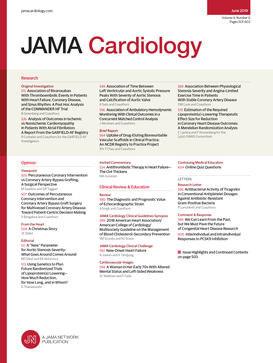心内超声心动图与经食管超声心动图在房颤消融中的应用:一项随机临床试验。
IF 14.1
1区 医学
Q1 CARDIAC & CARDIOVASCULAR SYSTEMS
引用次数: 0
摘要
经食管超声心动图(TEE)是房颤(AF)消融前血栓筛查的标准成像方式,但存在操作风险。心内超声心动图(ICE)是一种替代方法,可以提供相当的安全性和程序优势。目的探讨ICE在预防房颤消融术中围术期血栓栓塞事件方面是否优于TEE。设计、环境和参与者该多中心随机临床试验于2022年8月至2023年7月在中国的10家医院进行,随访30天,纳入符合预定资格标准的房颤患者进行导管消融。数据分析时间为2023年8月至2023年12月。干预措施:消融前用ICE或TEE筛查血栓。主要结局和测量主要终点是围手术期血栓栓塞事件(中风、短暂性脑缺血发作或全身性栓塞)的发生率。次要终点包括血栓检测、手术安全性和效率以及患者报告的舒适度。结果共1810例患者(平均[SD]年龄64.3[9.4]岁,女性868例[48.0%],阵发性房间隔患者887例[49.0%])随机分为ICE组(n = 906)和TEE组(n = 904)。906例ICE患者中有4例(0.4%)发生血栓栓塞事件,904例TEE患者中有5例(0.6%)发生血栓栓塞事件(风险差异为-0.11%;Farrington-Manning 95% CI, -0.84%至0.62%;非效性P = 0.01)。血栓的检出率为2.0% vs 1.5%(相对危险度[RR], 1.29; 95% CI, 0.64-2.61;48) ICE组比TEE组有更多的非左房附件血栓(0.6% vs 0%; P < 0.001)。经间隔穿刺相关大出血在ICE组较低(0.2% vs 1.2%; RR, 0.18; 95% CI, 0.04-0.81; P = 0.03)。ICE减少平均(SD)透视时间(4.2 [1.5]vs 9.3[3.0]分钟;P <。0.001),手术前等待时间(14.4 [8.0]vs 23.6[10.5]小时;P < 0.001)。焦虑或抑郁患病率(24.6% vs 37.5%; RR, 0.66; 95% CI, 0.56-0.76; P < 0.001)。结论和相关性在这项多中心随机临床试验中,ICE在预防房颤消融血栓栓塞并发症方面不逊色于TEE,并且在安全性、效率和患者舒适度方面具有额外的优势,支持其作为临床实践中可行的替代方案。临床试验注册。gov标识符:NCT05466266。本文章由计算机程序翻译,如有差异,请以英文原文为准。
Intracardiac vs Transesophageal Echocardiography in Atrial Fibrillation Ablation: A Randomized Clinical Trial.
Importance
Transesophageal echocardiography (TEE) is the standard imaging modality for thrombus screening prior to atrial fibrillation (AF) ablation but carries procedural risks. Intracardiac echocardiography (ICE) is an alternative that may offer comparable safety with procedural advantages.
Objective
To determine whether ICE is noninferior to TEE in preventing periprocedural thromboembolic events in AF ablation.
Design, Setting, and Participants
This multicenter randomized clinical trial was conducted at 10 hospitals in China from August 2022 to July 2023, with a 30-day follow-up, enrolling adults with AF scheduled for catheter ablation who met predefined eligibility criteria. Data analysis was performed from August 2023 to December 2023.
Interventions
Thrombus screening with ICE or TEE prior to ablation.
Main Outcomes and Measures
The primary end point was the incidence of periprocedural thromboembolic events (stroke, transient ischemic attack, or systemic embolism). Secondary end points included thrombus detection, procedural safety and efficiency, and patient-reported comfort.
Results
A total of 1810 patients (mean [SD] age, 64.3 [9.4] years; 868 women [48.0%]; 887 patients [49.0%] with paroxysmal AF) were randomized to ICE (n = 906) or TEE (n = 904). Thromboembolic events occurred in 4 of 906 patients undergoing ICE (0.4%) and 5 of 904 patients undergoing TEE (0.6%) (risk difference, -0.11%; Farrington-Manning 95% CI, -0.84% to 0.62%; P for noninferiority = .01). Thrombus was detected in 2.0% vs 1.5% (relative risk [RR], 1.29; 95% CI, 0.64-2.61; P = .48) with ICE vs TEE, respectively, with more non-left atrial appendage thrombi in ICE (0.6% vs 0%; P < .001). Major bleeding related to transseptal puncture was lower with ICE (0.2% vs 1.2%; RR, 0.18; 95% CI, 0.04-0.81; P = .03). ICE reduced mean (SD) fluoroscopy time (4.2 [1.5] vs 9.3 [3.0] minutes; P < .001), preprocedural waiting time (14.4 [8.0] vs 23.6 [10.5] hours; P < .001), and anxiety or depression prevalence (24.6% vs 37.5%; RR, 0.66; 95% CI, 0.56-0.76; P < .001).
Conclusions and Relevance
In this multicenter randomized clinical trial, ICE was noninferior to TEE for preventing thromboembolic complications in AF ablation and offered additional advantages in safety, efficiency, and patient comfort, supporting its use as a viable alternative in clinical practice.
Trial Registration
ClinicalTrial.gov Identifier: NCT05466266.
求助全文
通过发布文献求助,成功后即可免费获取论文全文。
去求助
来源期刊

JAMA cardiology
Medicine-Cardiology and Cardiovascular Medicine
CiteScore
45.80
自引率
1.70%
发文量
264
期刊介绍:
JAMA Cardiology, an international peer-reviewed journal, serves as the premier publication for clinical investigators, clinicians, and trainees in cardiovascular medicine worldwide. As a member of the JAMA Network, it aligns with a consortium of peer-reviewed general medical and specialty publications.
Published online weekly, every Wednesday, and in 12 print/online issues annually, JAMA Cardiology attracts over 4.3 million annual article views and downloads. Research articles become freely accessible online 12 months post-publication without any author fees. Moreover, the online version is readily accessible to institutions in developing countries through the World Health Organization's HINARI program.
Positioned at the intersection of clinical investigation, actionable clinical science, and clinical practice, JAMA Cardiology prioritizes traditional and evolving cardiovascular medicine, alongside evidence-based health policy. It places particular emphasis on health equity, especially when grounded in original science, as a top editorial priority.
 求助内容:
求助内容: 应助结果提醒方式:
应助结果提醒方式:


